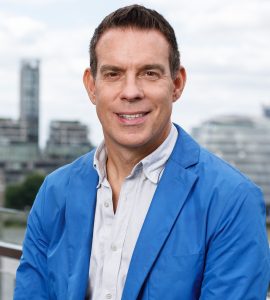Joining Forces for Independent Digital-First Consulting: Interview with CvE
by Mathew Broughton on 9th Aug 2022 in News

In association with CvE.
Following its acquisition of Canton Marketing Solutions last month, ExchangeWire speaks to CvE's Paul Frampton-Calero (president), Nick King (global VP of commercial), and Robert Webster (global VP of strategy) to discuss the importance of independence in consulting, as well as what’s next for the combined group.
How will the acquisition help bolster CvE’s consulting capabilities? Similarly, how will CvE’s expertise benefit Canton Marketing Solutions’ client roster?
Nick King: What appealed about the acquisition from our side was the fact that we were complimentary businesses, in that we sat in that consulting space yet, within that venn diagram, there was not much overlap. Our core skill is very much on pure technical consulting around the hardcore tech pieces: CDPs; the future of identity; all of those elements.
Paul and his team at CvE have some really smart consultants as well, but who focus more on areas such as operating model, media in-housing, and agile marketing. We can offer the technical knowledge from our side to a lot of the CvE clients, being able to move them forward on areas such as identity, and then vice versa, CvE can talk to our clients on the operating model.

Paul Frampton-Calero, president, CvE
Paul Frampton: CvE exists to help solve marketers’ most complex and urgent problems that come from a digital-first world, which is why we set up as a consulting business with a lot of people that have got media, media tech, and analytics backgrounds. As Nick said, it's very purposely set up to solve the problems that are most urgent for clients, rather than just say, "Spend more money on paid media" or "Move more money into Google or Facebook." Often, there are more urgent things that need attention, whether that is digital identity and marketing effectiveness; whether it's the way that your foundations for running media are put together; or whether it's the operating model.
Our collective ambition is that we help brands to navigate the transformation they're going through from a marketing perspective. By bringing Nick, Rob, and their team in, the combination of media, measurement, and technical skills means that we can do end-to-end consulting for marketing. Now we can cut across CRM; owned and earned media; paid media; analytics; ad tech; and martech.
How is the combined company preparing its clients for the deprecation of identifiers on desktop and mobile environments? Has the industry matured in terms of its preparations over the previous 18 months?
Robert Webster: Despite the Google news, people still definitely need to be looking at identity and how to reach their audiences. That's because over 50% of web impressions now aren't reachable by cookies. When you add up Safari; Firefox; those that have Chrome with privacy settings turned up; and CTV, these are all areas that can't be reached by cookies or IDs. Coming from a tech background and being in Europe, at Canton we focused on what we call the new data economy. Identity providers, clean rooms, and that CDP logged-in world as well.

Robert Webster, global VP of strategy, CvE
What working with CvE has added is that more holistic approach to that global flavour. We're able to take what we're doing with clients in the UK and Europe, but now apply that to a much wider canvas. Some of the chats that Paul and I have been having with advertisers recently is all about how we help them roll out identity globally. What works in the US doesn't work in Europe, and it's very different again when you go to Latin America or Asia. That global ability to work on these projects has been an exciting part of what we're doing here at CvE and the ability to work on clean rooms, CDPs, and identity is one of the things that differentiates the new combined group.
The market is definitely maturing, but it's still incredibly immature. You've got a really fragmented market, we've got reports here that show dozens of different ID providers, all with a slice of the pie. As I said, the ID providers that work in the US don't necessarily work in all markets. Right now, you have to work with all sorts of different providers to get to the reach that you want. It's maturing reasonably quickly, but it's still very immature.
How will the combined company help marketers capitalise on emerging opportunities, such as retail media?
PF: Most marketers, irrespective of which part of the landscape they're in, are obviously investing more heavily in their digital infrastructure. Whether you are a retailer or a consumer brand, you're increasingly looking at e-commerce and direct-to-consumer. Everything's moving towards digital, but the problem is digital is about to change dramatically and go back a decade or two in terms of targeting and measurement. It requires that reboot and to think about your foundations again. As an FMCG for example, that's not an easy thing to do because you've worked in a top-down mental availability and awareness-driving mode for the last 30-40 years with your product management teams. So there's a change mechanic there.
If you are a retailer that's suddenly woken up to the opportunity to use your first-party data, to take some of the budget away from Google and Facebook, you don't necessarily have the technology foundations because you're a retailer. You came from bricks and mortar, you didn't come from technology or e-commerce. Almost every brand has got gaps in their competency when it comes to digital transformation. The way that we think about how we can help is having people that are connected to some of these emerging trends.

Nick King, global VP of commercial, CvE
Retail media is the perfect eye of the storm because it's a digital identity piece. It's first-party data, it's ad tech, and it's a slightly different way of operating, because, in the world of media, until in-housing, most brands went through an agency. It was a fairly standard way of operating. But of course, when Facebook and Amazon came along, brands asked, "Why don't we just do this ourselves? We know our customers better than an agency does. We own the data." That's where we become quite a unique and interesting play because a retailer is not going to go to their existing media agency to get advice on how to in-house, nor will they go to their existing media agency to advise them on how to put the right ad tech and digital identity capability in place.
Brands may think that those relationships are a little flawed and biased towards spending money that benefits the agency. Whereas of course we don't care about how much is spent on media, we just care about getting the client to a good place. We don't charge on commission or a percentage of media, we charge based on our time and the value that we provide. That's the fundamental difference of the way that we turn up.
RW: One of the really important things about retail media is the data. Again, one of the reasons why we're strong on retail media is that we have that ability to work with CDPs and clean rooms, and to build them out for these brands in a way they're not used to. That dovetails with the approach that we have. Most agencies are there to run media, we're there to help people solve problems. The last kicker why I think that we've got the best-in-breed retail media proposition is that we have that US experience. Retail media in the US is much more mature. There are hundreds of marketplaces available to buy successfully. Taking what works in America, combining that with great data chops and then also understanding how that applies to privacy legislation, means we have a truly great offering.
In which verticals is digital transformation accelerating? How should brands approach digital transformation amid the current global economic uncertainty?
PF: Our focus is on the sectors where we're seeing a new wave of digital transformation, hence retail, and FMCG. We have a couple of QSR global clients who are talking about getting to a place where the vast majority of purchases are done digitally in some shape or form. FMCG. Travel's always been data rich and it's obviously built back up following the pandemic.
NK: Tech and telcos. Those brands that to a certain extent are direct-to-consumer. For companies with that richness of data that sits within their business, too much data is often the challenge. So those companies that sit in that space are where we help them break it down, and then build themselves back up again.
PF: On that economic uncertainty, everything we've seen through COVID, and through the recession prior to that, will say that, whilst there will be a downturn in consumer spending and in overall marketing and media spend, there'll be an upturn in the focus on digital marketing and on measurability. There's still a gap in the service model of how to support brands on that journey and you're seeing various different holding groups trying to launch businesses that have similarities to ours, but of course, what they don't have is the independence and the agnostic view when it comes to the commercial model. You can't just say, "Here's my in-housing consultancy next to my business that makes all of its money from spending paid media money." It doesn't compute because commercial models ultimately determine the nature of how a business services a client. Even in the next two years where we're going to see a downturn, there's still going to be huge demand for what we do, because as Sorrell often says, it might be that things are contracting here, digital is eating everything in terms of business and media.
RW: Every major advertiser now is also a data company, so they need to have the capabilities that were two generations ago the preserve of a hardcore data company. Now every single major advertiser has to behave that way to look after the customer's data and to make use of it.
In a downturn, you want to look towards automation, data, and technology. These are growth areas, even in a downturn. The pandemic meant that lots of companies build up a technical debt, you know, almost a debt in marketing about their processes. Even though we're in a downturn now, most progressive advertiser brands know they have to repay that debt and rebuild. So we're very confident in terms of growth for the future.
How can independent consultancies aid marketers in addressing scarcity of talent, which was recently cited as the most prominent challenge for UK marketers?
NK: Something which we very much focus on is having a graduate scheme. One thing that we've seen over the last few years is how many companies have said, "We're not going to bring talent in at the bottom, at stage one." We've also seen that the industry has become so siloed. Ironically, for automation and bringing things together, it should be breaking down silos. You have search departments; you have social departments; you have display departments; and you have CRM departments, never the twain shall meet. Where we very much focus on is having people who understand marketing and multiple channels, and making sure that we drive those people through so that as they move into the industry, they're actually able to talk eloquently to marketers.
RW: There's also a cultural element to this. Many companies try to hoard knowledge and keep it for themselves. Our style is to always give knowledge freely because we always back ourselves with our skill that we can always create new expertise tomorrow. We do that with our clients, the talent that's required needs to come somewhat from within. If you can work with people so that you improve their skills, that's training, but that's also giving knowledge freely and working on process and automation.
What is the importance of independence when consulting brands on data transformation and technology strategies?
RW: This importance is huge. There's an awful lot of different technologies out there. You look at a Lumascape, there's all these different buckets. The challenge is that many of the fastest-growing agencies recently have been effectively Google resellers. That means that they don't have independence, they always look to one solution for the truth. That doesn't work very well. There's a world beyond Google. The identity crisis shows you that there's more than one browser, and there's also a whole world of media that exists outside our technology. The independence that we have means that we can look at the whole market and be unbiased in our recommendations and selections. This is exactly what you need when you've got a lot of change going on, you need to be able to find the best solutions which might change month-to-month, year-on-year.
PF: The overall composition of the industry is not particularly independent when it comes to these things. Whether you look at the vendor side, where you're forced into a Google or Amazon view of the world, or the holding groups where you're forced into a WPP or Publicis view of the world, there is so much opportunity and complexity that brands need to know that they can go to certain partners to get an agnostic, non-biased view. We fundamentally don't think that's right for brands. It might impact the money we make from certain technology partners and a reseller, but we choose to make the decision that brands need the right advice for their business. That's why we believe independence is so important.
NK: How do you learn about these areas and how do you understand them and actually deliver something that's of value for clients that sit outside of it? Google is trying to build for those that only work within its ecosystem, so how do you solve for Amazon? How do you solve for Facebook? That's where we are very strong as we've got that breadth across all areas and all companies. We have to sit in a lot of meetings to understand the latest technologies and some of those vendors will probably be gone in 12 months, but we've actually gone through that process rather than going, "No, we've got our major provider."
DataIdentityM&ARetail MediaService Layer








Follow ExchangeWire